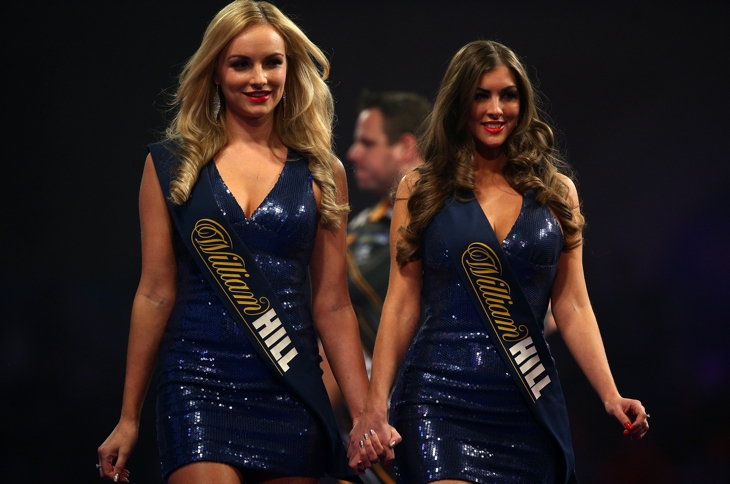So this week two things have got feminists cheering and whooping. First, the coming together of BBC women to demand a hike in their already eye-watering levels of pay. And secondly, the erasure of the walk-on women from darts, the sacking, effectively, of these beautiful, usually working-class women who bring a touch of glamour to a game dominated by portly blokes fond of their lager. Feminists applaud the wealthy, well-educated women of the Beeb who demand more money yet care not one jot for poorer women who, courtesy of the 21st-century lust for destroying outdated or allegedly offensive things, have just lost a source of their income. How brilliantly revealing.
That these two stories have exploded at the same time and are battling it out for the front pages of the papers — the Guardian has gone for the BBC women story, natch, while the Sun is backing the sacked darts women — tells us a lot about modern feminism. About its now Marie Antoinette levels of disconnection from ordinary people’s lives and concerns. About its morphing from a movement that was once concerned with improving the political and working lot of all women into a clique of like-minded upper middle-class women who might have each other’s backs but certainly don’t have the backs of those other women, those less well-off women, those foolish women who think it’s acceptable to use one’s looks or prowess to make a buck. Those women aren’t welcome in this choosy, aloof sisterhood.
It is remarkable that the BBC women demanding equality pay rises, many from a base of hundreds of thousands of pounds, have become the heroines of the new feminism. Imagine how this looks to the women out there for whom things have become so tight in these recessionary times that they might even struggle to pay their licence fee, that 147 quid a year that goes towards the paltry quarter of a million some of the Beeb’s sad-faced new Suffragettes must scrape by on. Indeed, women are more likely than men to be jailed for failing to pay their licence fee. In 2015, 20 women in England and Wales were banged up for licence-fee crimes. Experts reckon this is because women are more likely to answer the door and engage with inspectors. Someone could write a brilliant grotesque satire on a nation in which female broadcasters earning vast amounts of money become objects of media sympathy while the women jailed for failing to contribute to these rich women’s coffers languish forgotten in prison cells. Margaret Atwood, your literary skills are required.
This is the nature of feminism today: it has become a well-off women’s racket. It has become a means for educated women to secure their position in the media, business and politics. Witness the new feminism’s myopic obsession with numbers of women on company boards, or the exact ratio of male-to-female guests on the Today programme, or how female MPs are addressed on Twitter. The vast majority of women, and men, do not work in these fields, of course. Feminism, clearly, isn’t for them. In fact, feminism is very often against them, especially if they are those ‘bad women’ who take jobs or have points of view that mainstream feminists disapprove of. Those women will be raged against by the sisterhood.
The way feminists talk about certain working-class women is disgraceful. The young glamorous hostesses at that ridiculous Presidents Club dinner were utterly infantilised by those FT reporters, and others in the media, to whom these women are not conscious creatures who made a decision to do a certain job but rather are wide-eyed victims in need of rescue. The glamorous darts women are laughed off the public stage as if their choices and lives do not matter. As journalist and feminist Sally Howard said on This Morning yesterday, their job losses are ‘necessary’ — ‘every social change has people who suffer from it’. Imagine being so cavalier about women’s livelihoods. Page 3 girls? Sack them. Women who work for lads’ mags? Erase them. Women who question the MeToo movement, whether it’s film stars like Catherine Deneuve or just an ordinary working woman on Twitter who doesn’t think a hand on the knee is all that bad? Shout them down. Shut them up. ‘Be silent, woman, you don’t know what you’re talking about.’
It increasingly seems that there is one kind of person who irritates the new feminists more than men do: women who don’t think or behave as feminists expect them to. Women who think for themselves. These women will be written off as suffering from ‘internalised misogyny’. Whether they’re voting for Trump or Brexit, or doing jobs that involve wearing revealing clothes, or questioning the sexual-harassment panic, or doing something else that the feminist elite disapproves of, these women will be diagnosed as having had their brains warped by The Culture. It is the most sexist idea of our times, this notion that certain women cannot think for themselves and thus must be corrected, saved or possibly condemned by rich, right-on women in the media and politics. Indeed, the feminist idea of ‘internalised misogyny’ rehabilitates the old, foul notion that women whose thinking diverges from the mainstream are mad somehow. The universe is barely large enough to contain the irony of this.







Comments